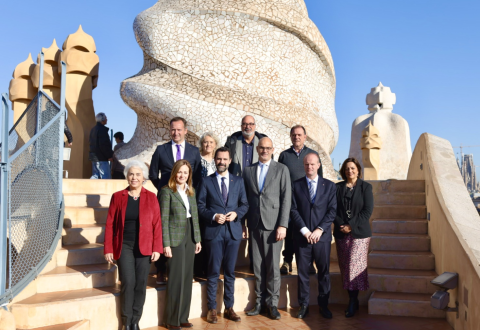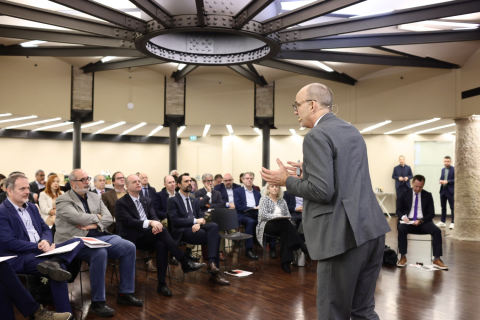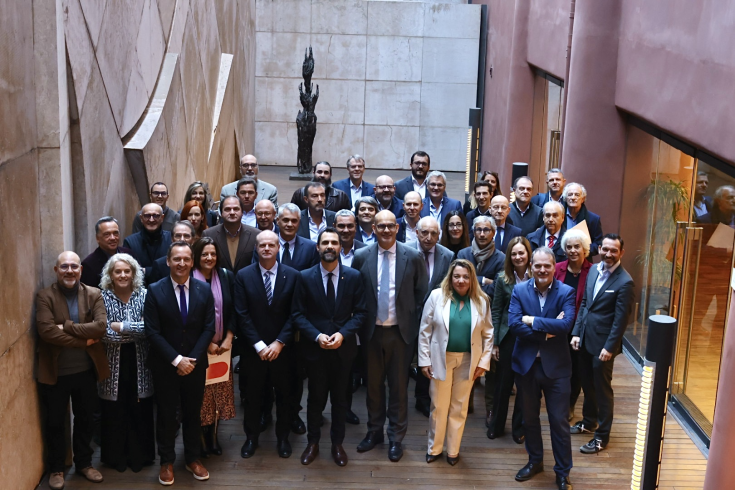Harvard study the case of cluster policy in Catalonia
Students from Harvard Business School will study the case of cluster policy in Catalonia and the impact it has had on the competitiveness of Catalan companies. This was announced this Monday by the Minister of Business and Labour, Roger Torrent, and Harvard Business School researcher Christian Ketels during a meeting with the presidents of Catalan clusters and ecosystem representatives held in La Pedrera-Casa Milà in Barcelona. The event was also attended by the Secretary of Business and Competitiveness and CEO of ACCIÓ-Catalonia Trade & Investment, Albert Castellanos.
The students who will study the Catalan case are specialized in Microeconomics and Business Competitiveness from the MBA and Master in Public Administration (MPA) courses, in addition to students from these courses and students from a hundred international universities that collaborate with Harvard Business School, who will also have access to the study of the Catalan case.
The Minister of Enterprise and Labour, Roger Torrent, assured during the meeting that "the cluster policy is a successful activity and is very important for the Government and for the competitiveness of the Catalan economy. In the last three years, 400 new companies have joined the clusters, gaining muscle for the future". Torrent stressed that "companies increasingly have a business culture of more teamwork, of looking at their surroundings and making a generous effort to work together to find more efficient solutions for everyone". In this sense, the Minister of Enterprise and Employment said that "we are attentive to the dynamism and plurality of the Catalan business network, which is why we are open to incorporating new clusters as new business sectors consolidate in the future".

On the other hand, the Harvard Business School expert stressed that "Catalonia is a global reference in cluster policy. Many regions of the world can learn from how public policies and cluster structures have adapted to economic and global changes over the last thirty years". Ketels, a world reference in the field of business competitiveness, explained that "today, Catalonia has a cluster structure that operates from the private sector, while the government, through ACCIÓ, supports them with a global vision of which sectors best characterize the Catalan economic fabric. Therefore, this policy is a clear and effective example that can serve as a learning experience for other regions".
The case study analyzes the evolution of the cluster policy in Catalonia, promoted since 1992 by ACCIÓ-Catalonia Trade & Investment, the Business Competitiveness Agency of the Ministry of Business and Labour. It highlights that "few initiatives have been maintained over such a long period" and the "strong indications that this success in keeping this program active reflects the value it brings to Catalonia and its economy".
In this sense, it emphasizes that the directors confirm how their participation in the cluster activities has helped their companies "in a decisive way" and that they have better indicators such as turnover, job creation, innovation, or internationalization than companies that do not belong to these organizations.
The case also recalls the initiatives promoted by ACCIÓ-Catalonia Trade & Investment over the last decades to facilitate strategic change for Catalan companies that are part of clusters and international prospecting missions for clusters to learn about best practices in other regions. It also recognizes that Catalonia is a pioneer in shared value to contribute to a new, more conscious capitalism and the interconnection of cluster policy with other competitiveness policies.
Similarly, regarding the environment, the case highlights that the organization TCI Network - the global network of professionals and organizations active in cluster-based economic development - is located in Barcelona, a city "recognized as a leading European and world metropolitan hub". Indeed, it highlights Catalonia's "strong industrial tradition", the fact that it has been awarded the status of strong innovator by the European Commission in the European Innovation Ranking, as well as recent investments by multinationals such as Microsoft, with the opening of an AI-focused R&D center in Barcelona, or the R&D hub of the pharmaceutical company AstraZeneca.

Harvard Business School case also highlights Catalonia's activity in international networks related to clusters and projects funded by the European Union. It highlights that, with 41 clusters registered in the European Cluster Collaboration Platform, Catalonia is the region with more organizations than Lithuania, Bavaria (Germany), and Baden-Württemberg (Germany), and that Catalonia is also the European region with the highest number of clusters that have received funding from the European Union's Euro clusters program.
